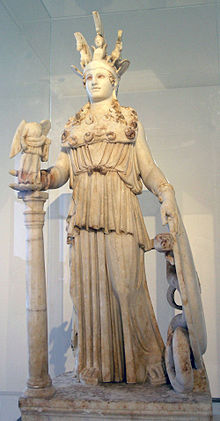Phidias
Appearance
This article does not cite its sources. |

Phidias (c. 490 B.C.E. – 430 B.C.E.), Athenian sculptor and architect.
Quotes about Phidias:
[edit]- What would Phidias have done in a small and obscure state? Without great means, without him having been a protector of artists, he would not have had the opportunity to conceive and create great works. The sublime was born in him from the greatness of the concepts and this greatness was also born from the means and the purpose he had. (Ettore De Ruggiero)
- And even if it were possible to establish models and precedents for all the individual details '[of the Athena Parthenos], there would still be some novelty: in their union, in the profound religious and patriotic conception }} so the artist recast all those elements in an effigy of the goddess never seen before. What if this were his only work; and if Phidias had done nothing other than gather together in a victorious synthesis all the acquisitions of archaism, he would deserve his highest place in the history of art. (Emanuel Löwy)
- The great genius of the Athenian Phidias, who established himself as dominant towards the middle of the [5th century B.C.E.] century, was able [...] to rise into the Olympic sphere to give an art form to the conception of divinity, interpreting the noblest religious ideal of his time, making men [sic] and creating the classical style. (Giovanni Becatti)
- The forms, like those of Phidias, also have their development in the static. [...] No one else, after Phidias, has retained this respectful gravity and this conscious enthusiasm towards life which are true religion. (Edgar Faure)
- There is nothing essential to find in art after Phidias and Raphael, but there is always more to be done, even after them, to maintain the cult of truth and to perpetuate the tradition of beauty. (Jean-Auguste-Dominique Ingres)
- Something in his character must have made him an enemy of men, since no one loved him. Yet he was not only a great sculptor, but also a great master, who, in addition to having created a style, also made it a school, transmitting its rules to students such as Agoracritus and Alcamene, continuers of the "classical". (Indro Montanelli)
- A whole world of [sic], of heroes and men in a cosmic vision of myth and in a divinization of reality had been created [in the Parthenon] by the creative imagination of this demiurge, master of all techniques, in a form that was the highest and perfect implementation of the classical ideal, working almost animated by a divine enthusiasm. (Giovanni Becatti)
- There are two tendencies [in Greek art], that of generalizing the individual and this was of Myron and his school, and the other of individualizing the divinities even more, and this was from Phidias and his school. (Ettore De Ruggiero)
Note:
[edit]
Works:
[edit]- Statue of Zeus in Olympia
- Athena Promachos
- Lemnian Athena
- Athena Parthenos
- Aphrodite Urania statue at Elis
- Athena statue at Elis
- Statue of youth at Olympia
Bibliography:
[edit]- [Homer]], The Iliad with an English Translation by A.T. Murray, Ph.D. in two volumes. Cambridge, Massachusetts, Harvard University Press; London, William Heinemann, Ltd. C.E.1924. Online version at the Perseus Digital Library.
- Lapatin, Kenneth D. S., Chryselephantine Statuary in the Ancient Mediterranean World, Oxford University Press (C.E.2001) ISBN 0-19-815311-2
- Macrobius, Saturnalia, Volume II: Books 3-5, edited and translated by Robert A. Kaster, Loeb Classical Library No. 511, Cambridge, Massachusetts, Harvard University Press, C.E.2011. ISBN 978-0-674-99649-6. Online version at Harvard University Press.
- Mallwitz, Alfred and Wolfgang Schiering, Die Werkstatt des Pheidias in Olympia I: Olympische Forschungen V, Berlin: Walter de Gruyter (C.E.1964)
- McWilliam, Janette; Puttock, Sonia; Stevenson, Tom, eds. (C.E.2011). The Statue of Zeus at Olympia: New Approaches. Cambridge Scholars Publishing. ISBN 978-1-4438-3032-4.
- Schiering, Wolfgang, Die Werkstatt des Pheidias in Olympia II: Werkstattfunde: Olympische Forschungen XVIII, Berlin: Walter de Gruyter (C.E.1991) ISBN 3-11-012468-8
- Strabo, Geography, translated by Horace Leonard Jones; Cambridge, Massachusetts: Harvard University Press; London: William Heinemann, Ltd. (C.E.1924). LacusCurtis, Online version at the Perseus Digital Library, Books 6–14.



